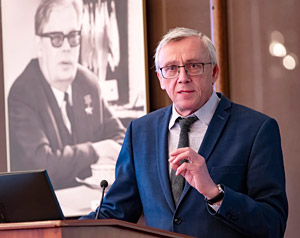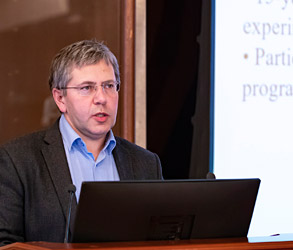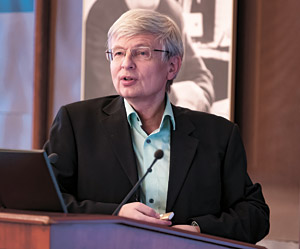
Electronic english version since 2022 |
The newspaper was founded in November 1957
| |
At PAC meetings
Nuclear Physics: a Seven-Year Programme
On 26 January, the regular 56th meeting of the JINR Programme Advisory Committee for Nuclear Physics was held. The participants discussed the Institute's plans for nuclear research in the new Seven-Year Period of JINR for 2024-2030. The Committee met with a new members and a new Chairman Valery Nesvizhevsky, a researcher at the International Institute Laue-Langevin (ILL) in Grenoble.
The working programme of the meeting was opened by JINR Director Grigory Trubnikov with a review report on the activities of the Institute. In his speech, JINR Director noted the role of international cooperation in science. "Basic research at the Institute shows that science really brings nations together. The new membership of the Committee, as always, has brought together high level specialists from all over the world including representatives from Asia, Latin America, Africa, Europe and many partner countries of the Institute," he said.
During the discussion of the current meeting of the PAC, the research plans of the Institute in the field of nuclear physics for the next seven-year period were considered. JINR Director Grigory Trubnikov told the participants about the main ideas underlying the structure and content of the Seven-Year Plan. "Our goal," the speaker highlighted, "is to offer a reliable, open, globally demanded research programme at JINR facilities that is able to enhance the international recognition that the Institute already enjoys.

JINR Vice-Director Sergey Dmitriev spoke about the Resolution of the 132nd session of the Scientific Council (September 2022) and the decisions of the Committee of Plenipotentiaries of the Governments of the JINR Member States (November 2022).
 Director of Flerov Laboratory of Nuclear Reactions Sergey Sidorchuk briefed the meeting participants on the current research and the status of the FLNR scientific infrastructure and spoke about the Laboratory's plans for 2024-2030. One of the main areas of the FLNR scientific programme will be the synthesis and investigation of the properties of new superheavy elements at the Factory of Superheavy Elements. Obtaining materials for this work will be a separate task for the Laboratory, since reactions for the synthesis of new elements will involve the use of such exotic isotopes as chromium-54 and titanium-50. Rare materials are also required for the target - berkelium, californium. In this matter, JINR's cooperation with institutes and enterprises of the State Corporation Rosatom plays a key role.
Director of Flerov Laboratory of Nuclear Reactions Sergey Sidorchuk briefed the meeting participants on the current research and the status of the FLNR scientific infrastructure and spoke about the Laboratory's plans for 2024-2030. One of the main areas of the FLNR scientific programme will be the synthesis and investigation of the properties of new superheavy elements at the Factory of Superheavy Elements. Obtaining materials for this work will be a separate task for the Laboratory, since reactions for the synthesis of new elements will involve the use of such exotic isotopes as chromium-54 and titanium-50. Rare materials are also required for the target - berkelium, californium. In this matter, JINR's cooperation with institutes and enterprises of the State Corporation Rosatom plays a key role.
Further investigations of the properties of heavy and superheavy elements and the mechanisms of nuclear reactions will be carried out. Laboratory specialists will study exotic decay modes of light nuclei, mechanisms of production of light exotic nuclei. For such a rich scientific programme, the Flerov Laboratory of Nuclear Reactions will construct new and upgrade the current facilities. Already this year, the modernized U-400M booster will start operating. It is expected that the U-400R booster will be reconstructed in the new seven-year period. FLNR will also develop new separators, including STAR and SKIF, for which the building of the U-400R complex will be erected. A new superconducting ion source ECRIS operating at a frequency of 28 GHz will operate at the SHE Factory. The possibility of establishing a radiochemical laboratory of class I is also currently studied.
The PAC listened with interest to the report on the main achievements of FLNR for the period 2017-2023 and expressed support for the proposed strategy for the development of research in heavy ion physics for the period 2024-2030. The PAC expects these research areas to be presented in topics and projects at the next PAC meeting in June 2023.
 Director of the Frank Laboratory of Neutron Physics Valery Shvetsov spoke about the tasks of the Laboratory in the field of neutron nuclear physics for the new seven-year period in his report. FLNP specialists are going to increase the intensity of the IREN facility and its operating time to 3000 hours per year. The new seven-year plan also includes the modernization of EG-5, the development of the TANGRA project. In the ultracold neutron research area, the basic task of the laboratory team will be the development of a UCN source at the IBR-2 reactor. An important area in 2024-2030 will be the work on the development of the new neutron source "Neptune".
Director of the Frank Laboratory of Neutron Physics Valery Shvetsov spoke about the tasks of the Laboratory in the field of neutron nuclear physics for the new seven-year period in his report. FLNP specialists are going to increase the intensity of the IREN facility and its operating time to 3000 hours per year. The new seven-year plan also includes the modernization of EG-5, the development of the TANGRA project. In the ultracold neutron research area, the basic task of the laboratory team will be the development of a UCN source at the IBR-2 reactor. An important area in 2024-2030 will be the work on the development of the new neutron source "Neptune".
The PAC listened with interest to the report on the main achievements of FLNP for the period 2017-2023. It is recommended to carry out further scientific research in nuclear physics in 2024-2030 using FLNP neutron facilities, such as the IREN pulsed resonance neutron source, the IBR-2 pulsed reactor and the EG-5 electrostatic generator, with opening several projects. The PAC recommended the work on the development of IREN to be singled out as an infrastructure project, given that this facility should become the base for research in nuclear physics at FLNP.
 Head of the Department of DLNP Evgeny Yakushev made a report "Research on non-accelerator neutrino physics and astrophysics, proposals for the Seven-Year Plan for Development of JINR for 2024-2030". The PAC noted with satisfaction that the knowledge of the staff and the ability to construct world-class facilities, measurements on them and obtaining results at world level are widely used within the framework of the topic. The PAC supported the general area of development of the work, participation in prestigious international projects providing access to cutting-edge developments for implementation of home neutrino experiments.
Head of the Department of DLNP Evgeny Yakushev made a report "Research on non-accelerator neutrino physics and astrophysics, proposals for the Seven-Year Plan for Development of JINR for 2024-2030". The PAC noted with satisfaction that the knowledge of the staff and the ability to construct world-class facilities, measurements on them and obtaining results at world level are widely used within the framework of the topic. The PAC supported the general area of development of the work, participation in prestigious international projects providing access to cutting-edge developments for implementation of home neutrino experiments.
The Committee recommended the topic to be restructured and larger projects in neutrino physics and astrophysics to be presented at the next meeting. The PAC insists on the significance of efforts in the Laboratory for the further improvement of the experimental facilities at JINR and at Lake Baikal.
BLTP Deputy Director for Research Nikolay Antonenko presented the basic tasks of BLTP in the investigation of the theory of nuclear systems, the state of affairs and proposals for the Seven-Year Plan. He also made a proposal to extend the topic "Theory of nuclear systems". The PAC decided to listen to this proposal and announcements about the opening of new projects under the proposed topic at the next meeting in June 2023.
 |
 |
| Vladimir Korenkov | Nikolay Antonenko |
MLIT Director Vladimir Korenkov briefed the participants of the meeting on the status and prospects of the scientific programme of the Laboratory. The PAC listened with interest to the report on the main activities and achievements of MLIT over a seven-year period and completely supported the MLIT programme concerning the development of the data processing infrastructure of JINR, as well as methods, algorithms and software for simulating physical systems, mathematical processing and analysis of experimental data.
The PAC members met with JINR Directorate. The work of the meeting was completed with the preparation of the PAC recommendations and proposals for the agenda of the next meeting.
Evgeny MOLCHANOV,
photo by Elena PUZYNINA